Time Schedule
|
Routes communications according to a time schedule. |
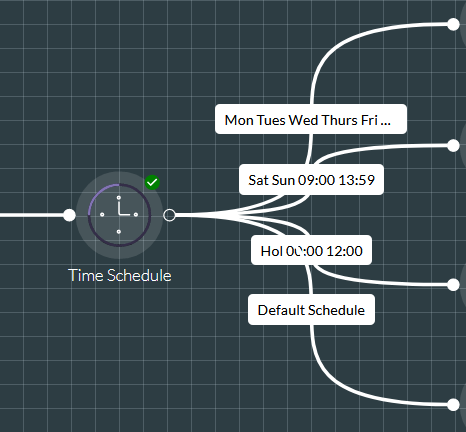
For example, you may want callers to be routed to a main IVR menu between 9am and 5pm on weekdays, to an outbound number between 10am and 2pm on weekends, to an audio announcement during holidays, and to voicemail at any other time.
Properties
Non Recurring Holidays Section
Priority Section
This populates as you add exit routes (see below). At run time, the action cell takes the first exit route matching the current date and time. You can reorder the list by dragging items. You should order your list in the order in which you wish the time bands to be checked (typically holidays first and your normal business hours last, so that calls are not routed according to business hours on holiday days).
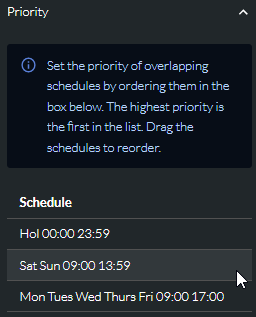
The Default route is not listed. It is taken when none of the listed routes results in a match.
Public Holidays Section
Choose a public holiday by configuring the options below:
|
Option |
Description |
|
Country |
Select the country for which the action cell should list the annual public holidays. |
|
Subdivision |
Select the country's sub-division (region) for which the action cell should list the annual public holidays. |
|
Public Holidays |
Select the desired public holiday. |
|
Use Observed Date |
This option is for a public holiday that may be observed on a date other than the actual date for that holiday. For example, in the UK, if Christmas Day falls on a Saturday, then the observed date will be on the following Monday. Clear the check box if you do NOT want to use the observed date for the public holiday. |
Click Add to add the public holiday to the action cell. The holiday appears in the list below the Add button. The list displays the next date on which the public holiday will fall. A superscript '+' symbol indicates that you selected the Use Observed Date option for the holiday.
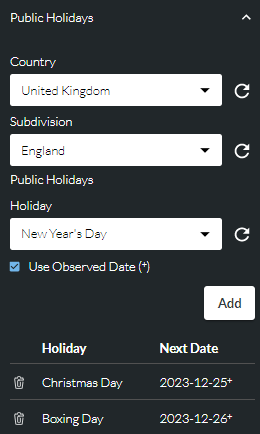
Note: you can include further public holidays in the action cell, provided they are in the same country or subdivision as the holiday you have already added. If your script requires you to include public holidays in another country or subdivision, use another instance of the Time Schedule action cell for that country and then route this action cell's Default Schedule exit route to that action cell.
Recurring Holidays Section
Build a list of any recurring holiday days that the Holiday exit route (if included) should consider. Do this by selecting the desired options and clicking Add.
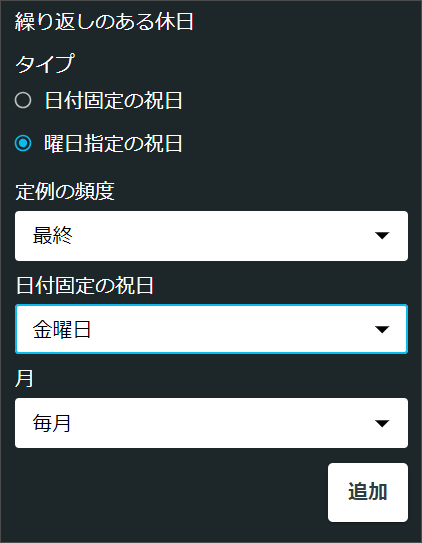
Non Recurring Holidays Section
Build a list of any nonrecurring holiday days or ranges that the Holiday exit route (if included) should consider. Do this by selecting the desired start and end dates per holiday and then clicking Add.
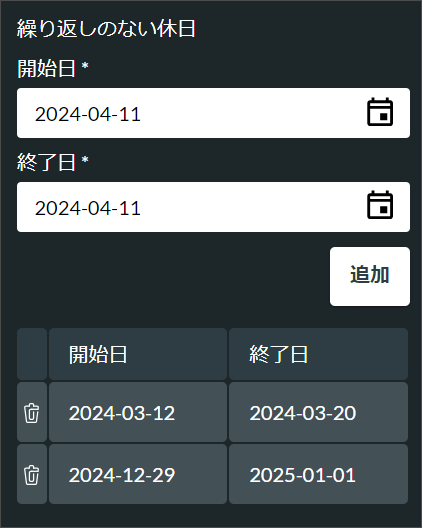
Exit Points
|
Exit Point |
Description |
|
This is taken when the current date and time falls within any of the timebands defined for this route. To define a timeband, select the desired days of the week and then define the times either by typing directly into the fields, or graphically by clicking Click
Note: an end time includes the first 59 seconds of the specified minute. In the example above, 16:59 can be read as 16:59:59. This is for a contact centre that closes at 17:00, which means that calls can be received right up to 16:59:59. Use 
Note: a timeband cannot span a midnight boundary. To cover a midnight boundary, you must create two timebands where the first ends just before midnight (23:59:59) and the second starts at midnight (00:00:00). You cannot edit a timeband. Instead, click the timeband's |
|
|
Default Schedule |
This is taken when the current date and time falls does not fall within any of the <timeband> exit routes. To define this route, select the 'Default Schedule' switch. |
|
Error |
This is taken if an error has occurred. |
 .
. to add the timeband to the schedule:
to add the timeband to the schedule:
 to define timebands for any holiday dates defined in the Properties section. According to the following illustration, contacts will be routed from the exit point at all times (midnight to midnight) on any holiday date defined in the action cell.
to define timebands for any holiday dates defined in the Properties section. According to the following illustration, contacts will be routed from the exit point at all times (midnight to midnight) on any holiday date defined in the action cell. button and then add another timeband.
button and then add another timeband.